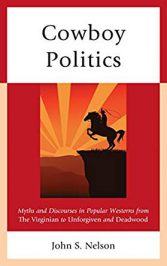The popularity of the American western is still unbroken. This has to do with the story lines, great landscapes, good soundtracks and mostly with the deeds of some heroic men (and sometimes women) who did “the right thing” in times of distress and usually in very rough and dangerous times.
 However, Cowboy Politics is not just another title on the beauty of the landscape or how simple life was in the West back then; or western production and camera angles for movies shot on location.
However, Cowboy Politics is not just another title on the beauty of the landscape or how simple life was in the West back then; or western production and camera angles for movies shot on location.
Actually, it is a study in political theory and certain aspects of American life that still are of relevance today, for the book consults works of fiction related to the West. The titles of particular interest for this study were classics such as Riders of the Purple Sage, Lonesome Dove, The Virginan, The Tall Stranger, Unforgiven, The Son, and HBO’s TV show Deadwood among a huge mix of media.
And many characters portrayed in the books and movies illustrate traits that today would be part of a political agenda, namely of a liberal or a republican nature. And there are many speeches and public declarations in the westerns that may have slipped our attention, but almost any time great actors as Wayne, Eastwood or Cooper addressed an angry mob, a gang of outlaws or a crowd at the saloon, their words were loaded with a political agenda. On another level, so are the countless monologues of actor Ian McShane, portraying historic Al Swearengen in Deadwood.
The many interesting findings of this large volume reveal that those – seemingly absolutely contradictory traits – were present simultaneously for the majority of the fictional heroes and protagonists if we consider their speeches and deeds. One reason for that was the sheer presence of real and immediate consequence if one liberal or republican theory – as good as it may have sounded – did not work. So the characters had to rely on (political) solutions that promised both safety, law and order as well as personal freedom and liberty to choose from in a young nation and new society that was only just developing. “Thus Cowboy Politic might be described as an exercise in political theory pursued as cultural studies,” argues Nelson.
Westerns in all kinds of media hence cite many different themes and political motifs: almost any theme from liberalism, populism, feminism, environmental consciousness, modernity, republicanism is represented here. Professor Nelson uses the methods and analytic thinking based on the works of Hannah Ahrendt in his large study; he also cites from Hobbes and Whitman very often.
The rather complicated theories Nelson tries to explain are demonstrated and explained by numerous (and sometimes) famous scenes, episodes, dialogue and themes from the media at hand. More than 100 books, films and TV shows are mentioned here. This facilitates identifying the complex political ideologies a lot. “Popular genres make sense of politics by making the political myths that we live everyday. Thus popular genres are modes of practical thought and action.”
Although in his study on the western and myth making, he never tires of explaining the effects of the different political schools of thought for today’s politics, even though the examples he cites stem from works completed decades ago. For instance, Nelson in his last chapter muses on horses in western fiction under the headline of “The Western Culture of Horizons and Responsibilities.”
Furthermore, to see the big picture in a way, the tales of the West and this particular time always represented more than just regional aspects of a country, but stood for the future of the Western Civilization in general.
John S. Nelson is professor of political theory and communication at the University of Iowa and has published on popular culture in film, horror and science fiction topics and political theory before. Not an entirely easy to read text, but worth checking for any scholar of American Studies, Film Studies and political science.
Review by Dr. A. Ebert © 2018
John S. Nelson. Cowboy Politics: Myths and Discourses in Popular Westerns from The Virginian to Unforgiven and Deadwood. Lexington Books, 2018, 412 p.
